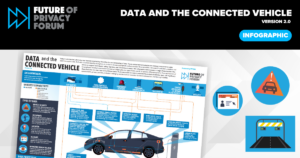Consumer Acceptance, Transparency, and Unique Privacy Considerations at the Forefront of FPF’s Discussion on Privacy and Vehicle Safety Systems
On March 21, the Future of Privacy Forum (FPF) hosted a conversation on “Driving the Conversation on Privacy and Vehicle Safety Systems” to discuss the future of certain technologies in vehicles. The panel discussion was moderated by Adonne Washington, FPF Policy Counsel for Data, Mobility, and Location, and included Hilary Cain (Senior Vice President for Policy at the Alliance for Automotive Innovation), Kristin Kingsley (Director of Program Development and Outreach at the Automotive Coalition for Traffic Safety), and William Wallace (Associate Director of Safety Policy at Consumer Reports). The event followed the launch of FPF’s new report, “Vehicle Safety Systems: Privacy Risks and Recommendations,” which focuses on Advanced Driver Assistance Systems (ADAS), Driver Monitoring Systems (DMS), and Impairment Detection Technologies.

FPF CEO Jules Polonetsky provided welcome remarks ahead of the panel discussion and highlighted how personal data and privacy are and will be implicated in new automotive technologies. In framing the discussion, he explained how many of these technologies, particularly impairment detection technologies, are so early in their development that there is more room for industry, civil society, regulators, policymakers, and other stakeholders to build out a consensus-driven framework that will guide their implementation and serve as a model for other emerging safety technologies.

Washington set the stage for FPF’s report and the panel discussion, noting the January 2024 Advanced Notice of Proposed Rulemaking (ANPRM) on Advanced Impaired Driving Prevention Technologies from the National Highway Traffic Safety Administration (NHTSA). The ANPRM comes out of the Bipartisan Infrastructure Law passed in 2021. FPF continues to investigate the privacy implications of impairment detection systems and other driver safety systems, such as those used for lane-keeping assist functions or to detect passengers in a vehicle. You can find FPF’s analysis and more on Data, Mobility, and Location on the website.
Most of the day’s discussion focused on the landscape of new driver safety automotive technologies, including driver impairment technologies, such as Alcohol Detection Systems, and the challenges needed to gain consumer acceptance of these technologies. Panelists highlighted the unique privacy challenges vehicles pose and the transparency and consent mechanisms needed to ensure individuals can exercise control over their data. Unlike more personal electronics, cars are typically owned by one person and operated by others. Cain noted that privacy is often considered in the context of the vehicle owners, but this model does not address the privacy of passengers or other drivers, including individuals who become owners later in the vehicle’s lifetime, such as through the secondary market.
Kingsley, who works with NHTSA through a public-private partnership on cooperative research to create the Driver Alcohol Detection System for Safety (DADSS), said that the project has been focused on privacy since its earliest stages, noting that “the only way we’re going to be able to deploy broadly is with consumer acceptance, and privacy is at the forefront of that.” Even though NHTSA has limited authority to regulate data privacy, she said that any NHTSA rule has to be practicable and is closely tied to considerations around individual privacy.
Cain underscored the importance of consumer trust in the technology rollout and highlighted the report’s findings that consumer trust in the automotive industry is still ahead of other industries. In light of subsequent news coverage about vehicle data collection practices, Cain affirmed the automotive industry’s commitment to the Alliance for Automotive Innovation’s 2014 Consumer Privacy Protection Principles, which require heightened protection for biometric data and driver behavior data, including information about driver impairment. Cain also noted that since the rollout of the Consumer Privacy Protection Principles, several states have enacted comprehensive state privacy laws and vehicle-specific privacy laws, which could be integrated into the principles. However, she said, “what we are begging for is a federal privacy law that would cover our industry along with every industry in the United States.”
All three panelists emphasized that the technologies to determine driver impairment are still nascent and unfamiliar to consumers. Wallace, discussing a camera-based approach to detecting driver impairment, noted that while consumers may generally like their vehicles, “the idea of having an in-cabin camera is very new, and we don’t fully know what the reaction will be.” However, he also argued that the potential to save ten thousand lives per year requires the industry to think about how best to implement the technology rather than whether to implement it at all. Wallace reiterated the importance of addressing automotive safety and consumer privacy, saying, “we are always looking at this through both lenses.”
To read the full report and the consumer survey findings, visit the FPF website, and be sure to watch Adonne Washington’s LinkedIn Live chat with CEO Jules Polonetsky on FPF’s YouTube Channel.



